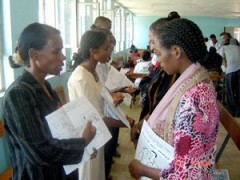
Elfinesh Duko, a health extension worker in Ethiopia, realizes she could not be as successful educating her community about health if it weren't for the volunteers that she trains, thanks to crucial volunteertraining knowledge provided by a USAID-supported health program.
"I work in a large kebele (ward) with more than 170 households. If it were not for the community volunteers, I would not be able to reach all the houses," said Duko, who covers the Sore Homba Health Post in Ethiopia's Southern Nations, Nationalities, and Peoples' Region.
Duko coordinates the activities of community health and nutrition promoters, who communicate health and nutrition messages in the ward as part of the Federal Ministry of Health's approach to delivering primary health care at the community level. The Ministry's health approach is supported by a USAID program that teaches health extension workers like Duko about principles of volunteerism, and trains them with strong communication skills.
Health extension workers are trained to lead community orientations, facilitate trainings for volunteers, and conduct behavior-change efforts with the family health card, a simple tool used to communicate important family health information and child immunization schedules to households.
"I have the confidence to train community volunteers after attending the health extension worker orientation. I understand the basic health themes that need to be relayed to the community. My communication and negotiation skills have also improved with this training," Duko said.
After her orientation, Duko began training local community health volunteers, who help her deliver health messages throughout the community. The partnership between the health extension workers and the volunteers has brought about noticeable changes in community engagement. As part of the USAID-supported program, health extension workers provide ongoing support to the volunteers by holding monthly experience-sharing meetings.
Duko and her health extension worker peers have trained more than 26,000 volunteers in their communities across Ethiopia.
Recently, Duko has been particularly impressed with her community visits: "There isn't one household where basic health messages have not been shared, and each household visited had a family health card. The community health volunteers have paved the way for us. They have simplified my life greatly. For my own sake, I will gladly train community volunteers," she said.







Comment
Make a general inquiry or suggest an improvement.